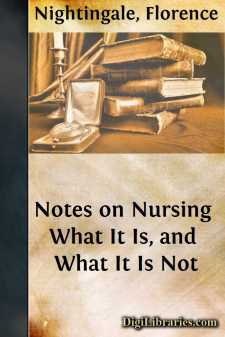Categories
- Antiques & Collectibles 13
- Architecture 36
- Art 48
- Bibles 22
- Biography & Autobiography 813
- Body, Mind & Spirit 142
- Business & Economics 28
- Children's Books 12
- Children's Fiction 9
- Computers 4
- Cooking 94
- Crafts & Hobbies 4
- Drama 346
- Education 46
- Family & Relationships 57
- Fiction 11828
- Games 19
- Gardening 17
- Health & Fitness 34
- History 1377
- House & Home 1
- Humor 147
- Juvenile Fiction 1873
- Juvenile Nonfiction 202
- Language Arts & Disciplines 88
- Law 16
- Literary Collections 686
- Literary Criticism 179
- Mathematics 13
- Medical 41
- Music 40
- Nature 179
- Non-Classifiable 1768
- Performing Arts 7
- Periodicals 1453
- Philosophy 64
- Photography 2
- Poetry 896
- Political Science 203
- Psychology 42
- Reference 154
- Religion 513
- Science 126
- Self-Help 84
- Social Science 81
- Sports & Recreation 34
- Study Aids 3
- Technology & Engineering 59
- Transportation 23
- Travel 463
- True Crime 29
Notes on Nursing What It Is, and What It Is Not
Categories:
Description:
Excerpt
I. VENTILATION AND WARMING.
[Sidenote: First rule of nursing, to keep the air within as pure as the air without.]
The very first canon of nursing, the first and the last thing upon which a nurse's attention must be fixed, the first essential to a patient, without which all the rest you can do for him is as nothing, with which I had almost said you may leave all the rest alone, is this: TO KEEP THE AIR HE BREATHES AS PURE AS THE EXTERNAL AIR, WITHOUT CHILLING HIM. Yet what is so little attended, to? Even where it is thought of at all, the most extraordinary misconceptions reign about it. Even in admitting air into the patient's room or ward, few people ever think, where that air comes from. It may come from a corridor into which other wards are ventilated, from a hall, always unaired, always full of the fumes of gas, dinner, of various kinds of mustiness; from an underground kitchen, sink, washhouse, water-closet, or even, as I myself have had sorrowful experience, from open sewers loaded with filth; and with this the patient's room or ward is aired, as it is called—poisoned, it should rather be said. Always, air from the air without, and that, too, through those windows, through which the air comes freshest. From a closed court, especially if the wind do not blow that way, air may come as stagnant as any from a hall or corridor.
Again, a thing I have often seen both in private houses and institutions. A room remains uninhabited; the fireplace is carefully fastened up with a board; the windows are never opened; probably the shutters are kept always shut; perhaps some kind of stores are kept in the room; no breath of fresh air can by possibility enter into that room, nor any ray of sun. The air is as stagnant, musty, and corrupt as it can by possibility be made. It is quite ripe to breed small-pox, scarlet-fever, diphtheria, or anything else you please.[1]
Yet the nursery, ward, or sick room adjoining will positively be aired (?) by having the door opened into that room. Or children will be put into that room, without previous preparation, to sleep.
A short time ago a man walked into a back-kitchen in Queen square, and cut the throat of a poor consumptive creature, sitting by the fire. The murderer did not deny the act, but simply said, "It's all right." Of course he was mad.
But in our case, the extraordinary thing is that the victim says, "It's all right," and that we are not mad. Yet, although we "nose" the murderers, in the musty unaired unsunned room, the scarlet fever which is behind the door, or the fever and hospital gangrene which are stalking among the crowded beds of a hospital ward, we say, "It's all right."
[Sidenote: Without chill.]
With a proper supply of windows, and a proper supply of fuel in open fire places, fresh air is comparatively easy to secure when your patient or patients are in bed. Never be afraid of open windows then. People don't catch cold in bed. This is a popular fallacy. With proper bed-clothes and hot bottles, if necessary, you can always keep a patient warm in bed, and well ventilate him at the same time....


